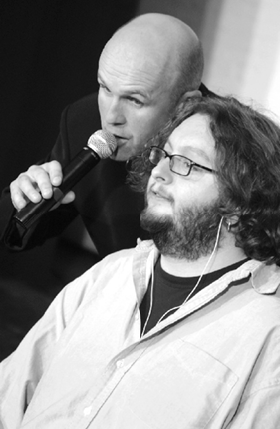By Rachel Breitman
In Tim Crouch’s “An Oak Tree,” theatergoers are treated to a rare sense of empowerment, as they watch a play with more knowledge of the drama unfolding than the actor onstage.
Crouch, who stars in the play as a bitter hypnotist performing his act in a crowded pub, brings a different male or female actor aboard each night to be his foil. The brave souls have not read a word of the script, but instead sight read, wear an earpiece for stage directions, and take onstage prompts from Crouch directly. They have neither seen nor read about the show beforehand.
“An Oak Tree,” which opened at the 2005 Edinburgh Festival, played internationally before opening at the Barrow Street Theater, where stage, screen, and television actors like F. Murray Abraham, Laurie Davis, Peter Van Wagner, Rachel Fowler, Charles Busch and Reed Birney have already been pioneers into the unknown. Joan Allen and Frances McDormand are waiting in the wings to take on the challenge later this month.
“I don’t think anything like this exists,” said Birney after his November 3rd performance. “It is like the best trust exercise you could have.”
Each night an unwitting actor steps into the role of a father whose young daughter has just died in a car crash. Crouch’s character just happens to be the driver responsible for her death. In the story, he accidentally calls the father onstage to take part in his two-bit hypnosis act.
Crouch was inspired to title his story after an artwork by Michael Craig-Martin of the same name. It pictured a glass of water on a shelf with an explanation that the artist had transformed the properties of a glass of water into a fully grown oak tree. The implication was that an artist can recreate and redesign by suggestion alone, much as a hypnotist does. Crouch believes this is the essential truth of theater.
“You put something in front of the audience, say it is something else, and the audience will go with it, they will buy it,” says Crouch. “They know that it isn’t really Hamlet or Lear onstage. But then all of a sudden it is.”
Crouch last performed in New York in his 2004 play “My Arm,” the story of a ten-year-old who has held his arms in the air for so long that the rest of his body has rotted away. He regularly departs from the convention of the stage to test the audience’s willingness to abandon reality. This time, he takes his actors along for the ride.
Like his willing victims, Crouch has also put himself in a precarious position in his latest work. When the play previewed in Germany, Latvia, Lithuania, Russia, and France, he performed with actors who spoke a different language than him. Crouch continued to speak English, and his lines were projected onstage in translation, while the other actor answered him in their native tongue.
He admits that the conscious unsteadiness of such a production “aims to dismantle the mechanics of theater entirely…and see how much we can project onto a performer who doesn’t know what he was supposed to do.”
In her October 8th performance, stage and television performer Rachel Fowler’s take on the father was so hypnotic that her husband actually thought she had been placed into a trance during the entire show.
“One of my challenges as an actor to get out of my own way,” said Fowler. “When I was onstage and Tim told me I was playing a 46-year-old man whose child had been killed, my whole body changed unconsciously. I felt the sadness, the disbelief, the anger, desperation, knee-buckle devastation. It was an absolute roller coaster.”
On the other side of the Atlantic, the play won a Herald Angel Award from the Glasgow Herald and received rave reviews from The Daily Mail and The Guardian. But for each new audience, it is a Rorschach test of sorts, an ink blot upon which they can project their own emotions and share in the actors’ confusion.
“Some people hate this play,” admitted Crouch, “and some people say it is the best play they have ever seen. Sometimes they buy it, and sometimes they don’t.”
Some of the struggle stems from the frequent breaks in the action as Crouch steps out of character just long enough to prompt the actor on their next line. To add to the confusion, the script calls for the Crouch to play several roles, acting as Crouch, the hypnotist, and finally Dawn, the hurt and angry wife who has lost her daughter and become distant from her grieving husband.
As the play jerks in fits and starts toward its conclusion, the viewer is frequently reminded that the players onstage are simply actors. Purposely inscrutable lines blur the story of father and hypnotist with the gambit of the uninformed performer and writer.
“Is it how you imagined it?” the hypnotist asks the father in the midst of the action. “Don’t you think it is a bit contrived?” he queries his partner, asking about both the hypnosis routine and the play itself.
The answer, of course, is yes.







































